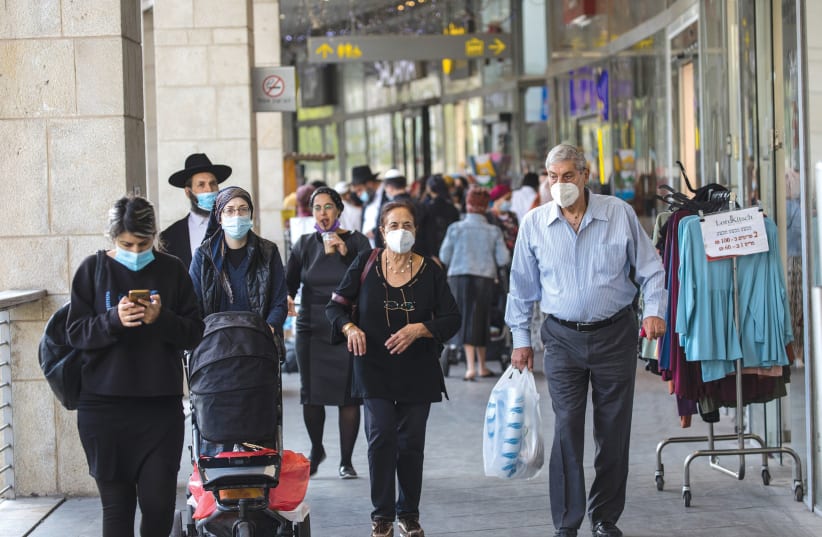Garden party
A library, a garden and a place for community gatherings – it’s all part of the recently inaugurated project in Gilo, aimed at facilitating meetings between students and neighborhood children. The project was launched by Bnei Akiva last week to the backdrop of trees, plants, benches frequented by seniors and a library open to all. The plan is to bring some 1,000 area children from first through fourth grade to spend their free time with Bnei Akiva students. Fifteen students, who receive a scholarship in return for their community work, are in charge of maintaining the garden.
Together and separated
For some 20 years if not more, the community council of the Ramot neighborhood has been a source of tension and anger between haredi and secular residents. Ramot is one of the capital’s largest neighborhoods. Haredim demand the election take place as one neighborhood, while seculars are adamant that the vote should be split in two: one community council for the haredim and another one – the larger one – for secular residents.
Members of the local secular population argue the split would ensure the haredi side does not dominate the entire neighborhood, and this appears to be a concern shared by most of Ramot’s secular residents. Last week, at the city council’s monthly meeting, tempers flared between councilman Yossi Havilio and Deputy Mayor Eliezer Rauchberger (United Torah Judaism) over the issue.
Rauchberger accused the council (and in fact the mayor himself) of breaking an agreement signed by all parties in the ruling city coalition, of which United Torah Judaism is a major member, to ensure one vote in Ramot.
Havilio countered that “what the haredim want is to run over us, the seculars living in the city.” Haredi representatives responded angrily.
But Havilio, a secular representative at city council, was not alone in making the argument. Another deputy mayor, Hagit Moshe – head of the religious Bayit Yehudi list and herself a resident of Ramot – said that two separated community councils is the best solution, to prevent unwanted friction.
With a tinge of irony in his voice, Rauchberger replied: “Yes, but only if it works for all city neighborhoods and not just for Ramot, in which the haredim are now about 80% of the residents.” Elections for seven community councils, including Ramot, are scheduled to take place in June.
More blood
A severe shortage of type O blood has prompted the Magen David Adom organization to run an emergency blood drive. There is also a need for other types, but the most severe shortage is in type O. Anyone who can is encouraged to donate blood. According to Health Ministry regulations, at least 28 days must have passed since you were exposed to someone infected with COVID-19 or since you yourself recovered from the virus.
Coming up short in court
Do a local council and community center take precedence over a nonprofit if both sides work for the benefit of the neighborhood? This question arose from a recent confrontation between the Sha’alvim association, which runs a daycare center for children – including some with special needs – and the municipality, through the Pisgat Ze’ev local council. Earlier this week, the conflict was resolved when a Local Affairs Court ruling led the municipality renounce its project to open another daycare center on the same street.
But the question remains: Who has the right to plan and decide which educational frameworks can operate, and where in the city? Who has the priority: the local council or the associations that have been offering their services for many years and have gained the trust and appreciation of residents?
In this specific case, the municipality and local council relented, and Sha’alvim will continue to operate as it has done for more than a decade, but as the court pointed out, the municipality, when planning projects, should take into consideration what is already existing and operating.
Credit where credit is due
A few months ago the government budgeted an emergency program to help needy families across the country by giving them special credit cards enabling them to buy food and basic merchandise with dignity – without food basket deliveries that embarrassed some of them.
The approved budget got stuck for a few months. Following an appeal to the High Court of Justice by a large food distribution association, the project was again green-lighted, but has still not been launched. Due to what the municipality calls “technical reasons,” thousands of families in the capital are still striving to survive, most of them thanks to the help of neighbors and small nonprofits.
The credit cards are an efficient way to ensure that needy residents – such as the elderly and families with many children – get enough nourishment without having to stand in line to get a food basket that doesn’t always suit their needs and customs, despite the best intentions.
Source at the welfare administration at Safra Square say the technical issue should be redressed shortly.
